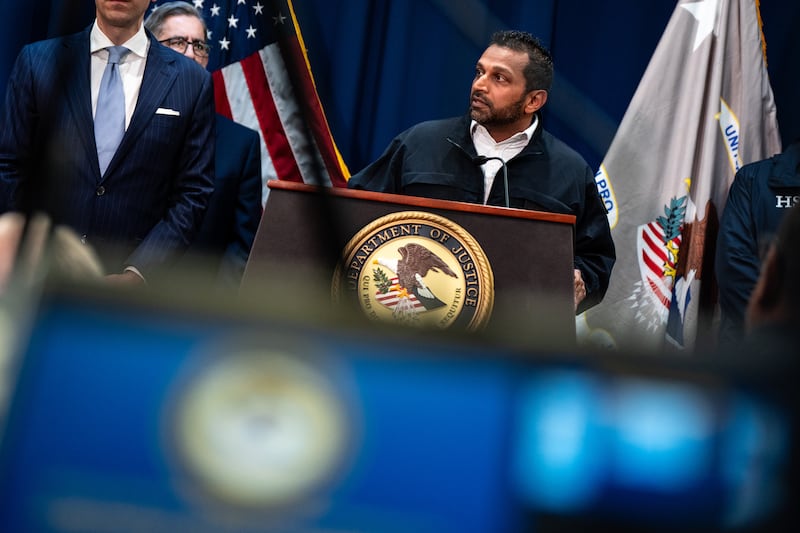The most absurd statement in an otherwise credible news conference Thursday about the arrests of professional athletes accused of illegal gambling was this: The nation’s legal sports gambling enterprises are among the victims.
Sure, no one is accusing these companies of any involvement in the two major cases announced at a press conference: one involving people accused of being part of an insider conspiracy concerning athlete performances in NBA games and the other involving many more people, including former professional athletes and mobsters, in high-stakes poker games that were allegedly rigged.
Landmark court case
Thursday morning was an extremely bad one for the NBA. Portland Trail Blazers coach Chauncey Billups, Miami Heat guard Terry Rozier and former Cleveland Cavaliers player and assistant coach Damon Jones were arrested. The investigations were wide-ranging and involved mobsters. That is not a good look.
But it wasn’t a big shock. Due largely to a 2018 U.S. Supreme Court case making sports betting allowable under state laws, the United States today is awash in a culture of gambling, arguably led by sportsbooks that saturate sports broadcasts with advertisements. You can dance around a muddy bog for only so long without getting dirty.
A year ago, the CBS show “60 Minutes” interviewed reformed gambler and current therapist Harry Levant, a specialist in gambling addictions, who talked about how these companies use algorithms fueled by artificial intelligence to lure people in.
“I have patients who gamble in the shower. I have patients who gamble before they get out of bed in the morning. I have patients who gamble while they are driving. There are no guardrails,” Levant said on the show.
College gambling
Things could get much worse. Beginning Nov. 1, a new NCAA rule will allow college athletes to gamble on professional sports games, something previously forbidden. They still won’t be allowed to gamble on college games, however.
Are we to expect that college athletes, after years of being allowed to bet on pro games, will suddenly lay aside that habit when they are drafted by a professional team and subsequently forbidden to gamble on those games? Or will Thursday’s bombshell announcement end up being a mere preview of coming events?
“We scientifically know the human brain, the risk-reward system for a young man isn’t fully formulated until you’re 25,” Levant told 60 Minutes.
A bad day for the NBA

U.S. Attorney Joseph Nocella Jr. spoke about players allegedly providing insider information. Gamblers often place proposition or “prop” bets on the individual performances of athletes. They wager on players scoring, rebounding or assisting at higher or lower amounts than average. This allegation relates directly to the integrity of the game.
The poker scheme allegedly involved former NBA players and mobsters, and some may have been connected to both investigations.
Les Bernal, national director of the advocacy group Stop Predatory Gambling, told me Americans are now paying the price for allowing legal gambling to “metastasize into every part of American life.”
A failed public policy
He harkened back to the words of NBA Commissioner Adam Silver, who in 2014 said the league had to allow legal gambling on games to get control of what had been widespread underground gambling. “I believe that sports betting should be brought out of the underground and into the sunlight where it can be appropriately monitored and regulated,” he wrote in a New York Times op-ed. The implication was that the league’s integrity would be protected.
Bernal said now, seven years after the Supreme Court’s ruling, we know this hasn’t worked. He believes illegal gambling problems have grown as a result of the legal enterprises and all the advertising. “We as a nation need to acknowledge this has been an epic failure as a public policy.”
Indeed, a study published earlier this year by the Journal of the American Medical Association found that sports wagers rose from $4.9 billion in 2017 to $121.1 billion in 2023. The number of people seeking help for addictions also dramatically increased.
Unfortunately, few people in Congress seem interested in this topic.
I don’t know how much deeper the current investigations will go or what the outcomes will be. Certainly, the NBA must confront this threat head on.
Circumventing state gambling laws

But the legal gambling “victims” of all this seem undeterred. As Marketplace.org reports, they are now moving into prediction markets, normally used only for cultural or event wagering.
Why is this noteworthy? Because, as the website notes, those markets are regulated by federal commodities rules, not state laws.
“Meaning they can operate even in big states where (sports) gambling is illegal like California and Texas.”
Or Utah, which until now has avoided being a real victim of gambling.


